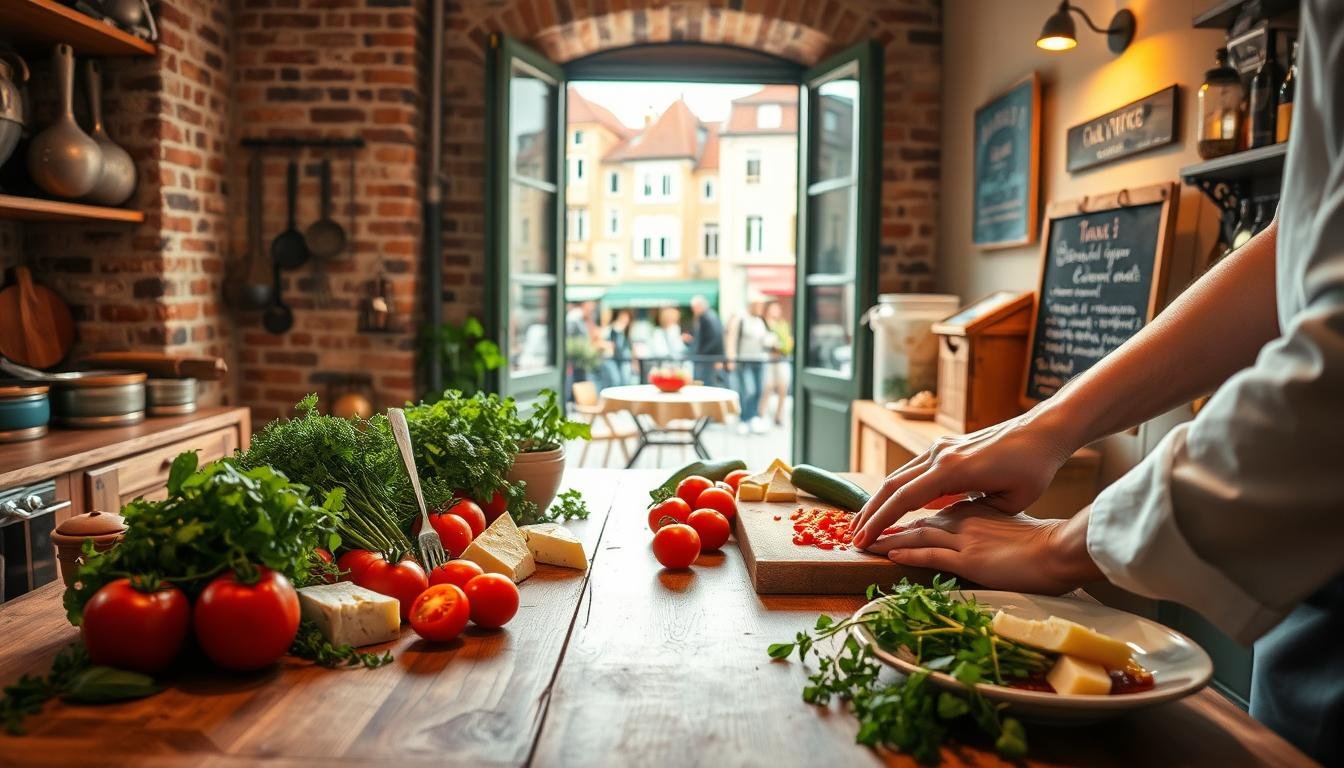Ever thought about what makes a trip truly memorable? Is it the stunning views, the lively culture, or the delicious local food?
Trying cooking classes abroad can change your travel game. It lets you explore a culture through its food and traditions. You’ll learn new cooking skills and see different cultural scenes.
Getting into culinary travel experiences is more than just learning recipes. It’s about understanding the local way of life. This mix of travel and food is what cooking classes tourism is all about.
Key Takeaways
- Discover the essence of global cuisines through hands-on cooking experiences.
- Develop your cooking skills in diverse cultural settings.
- Immerse yourself in local cultures and traditions.
- Explore the unique blend of travel and culinary exploration.
- Gain a deeper understanding of the local way of life.
What is Cooking Classes Tourism?
The world of gourmet cooking vacations is growing fast. It offers unique international culinary workshops. This trend lets travelers dive into local cultures through food.
Definition and Overview
Cooking classes tourism means traveling to new places for culinary adventures. You get to see local ingredients, techniques, and traditions up close. It’s a deep dive into a region’s culture, beyond usual tourist spots.
These experiences include cooking classes, workshops, farm-to-table meals, wine tastings, and tours. They let you learn about local food, ingredients, and cooking methods. You’ll appreciate the culture more deeply.
Importance of Culinary Experiences in Travel
Culinary experiences make travel more meaningful and memorable. By joining international culinary workshops, you learn about local culture. This creates a real connection with the places you visit.
Cooking classes tourism also boosts cultural exchange. Travelers learn from local chefs and cooks. They share stories and techniques passed down through generations. This enriches your travel, leaving you with lasting memories and a new love for cooking.
Benefits of Participating in Cooking Classes
When you join cooking classes, you do more than just learn new recipes. You dive into a world of flavors and traditions. This is what makes foodie travel adventures so special, letting you explore the culinary culture of your destination.
Enhancing Culinary Skills
Cooking classes are great for improving your cooking skills, no matter your level. Through hands-on cooking tours, you practice making local dishes. You learn about ingredients, techniques, and cooking methods specific to the area.
- Master new cooking techniques
- Learn about local ingredients and their uses
- Understand the cultural significance of different dishes
For example, a class in Italy might teach you to make pasta from scratch. A class in Thailand could show you how to balance flavors in a traditional dish.
Cultural Immersion
Cooking classes are a unique way to experience a culture. By learning to make local dishes, you get to see the culture, history, and traditions of your destination. It’s not just about cooking; it’s about understanding the role food plays in the community.
| Cultural Aspect | Culinary Expression |
|---|---|
| Traditional Ingredients | Use of local produce and spices |
| Cooking Techniques | Methods passed down through generations |
| Festive and Daily Dishes | Understanding the significance of certain dishes during festivals and daily meals |
Making Lasting Connections
Cooking classes also offer a chance to meet like-minded people. You can bond with your classmates and instructors over your shared love for food.
« Cooking is not just about the food; it’s about the people and the memories you create. »
By taking cooking classes, you improve your cooking skills and meet new people. It’s a win-win situation.
In conclusion, cooking classes offer a lot. They help you improve your cooking, immerse yourself in a culture, and make new friends. Whether you’re on a foodie travel adventure or just want to get better at cooking, these classes are rewarding.
Popular Destinations for Cooking Classes
Start a culinary adventure in the world’s top cooking spots. If you love cooking, some countries are famous for their rich food culture. You can learn new skills in culinary tourism classes that dive deep into local dishes.
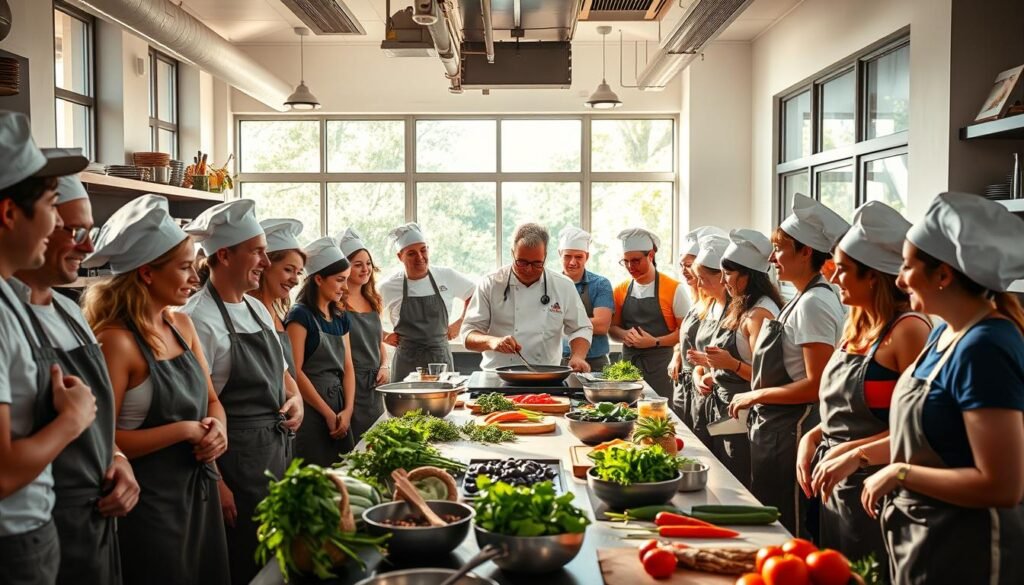
Italy: A Culinary Haven
Italy is a dream come true for food enthusiasts. It’s filled with immersive cooking retreats that highlight its varied regional foods. You can learn how to make pasta and pizza in the places where they were first created.
Italian cooking classes are often held in beautiful locations. This adds to the amazing food experience you’ll have.
Mexico: Spice and Flavor
Mexican food is known for its bold tastes and bright colors. It’s a favorite among cooking fans. You can uncover the secrets of dishes like tacos and mole in classes that focus on local ingredients and old techniques.
Mexican cooking classes are a great way to learn about the country’s rich food history.
Thailand: A Fusion of Tradition and Modernity
Thai food is famous for its mix of sweet, sour, salty, and spicy flavors. It draws many to its cooking classes. You’ll learn about the role of fresh herbs and spices in Thai cooking and try both traditional and modern dishes.
Thai cooking classes also teach about the cultural value of food in Thai society.
These places offer more than just cooking lessons. They give you a full culinary experience that mixes culture, tradition, and community. By joining culinary tourism classes, you don’t just learn new recipes. You also get to understand the local culture and people better.
Different Types of Cooking Classes
Gastronomic vacation packages now offer a variety of cooking classes. They cater to all skill levels and interests. Whether you’re new to cooking or have years of experience, there’s a class for you.
Hands-On Workshops
Hands-on workshops are perfect for diving into cooking. You’ll work directly with ingredients and learn from experts. You’ll gain practical experience and get to take home what you’ve made.
Online Culinary Courses
Online culinary courses are great for learning at home. They offer flexibility and cover many cuisines and techniques. You can learn at your own pace and review material as needed.
Farm-to-Table Experiences
Farm-to-table experiences focus on local ingredients. You’ll learn to cook and grow your own food. This approach promotes sustainability and connects you to your food.
« The way we eat is changing. People are becoming more aware of where their food comes from and are seeking more sustainable and locally sourced options. » – Food Industry Expert
To better understand the different cooking classes, here’s a comparison table:
| Type of Cooking Class | Learning Style | Key Benefits |
|---|---|---|
| Hands-On Workshops | Practical, interactive | Gain cooking skills, take home dishes |
| Online Culinary Courses | Flexible, self-paced | Convenient, revisit material as needed |
| Farm-to-Table Experiences | Hands-on, sustainable | Learn about local sourcing, sustainability |
By knowing the different cooking classes, you can pick the one that suits your goals and preferences.
How to Choose the Right Cooking Class
Exploring cooking classes tourism can make your culinary travel experiences better. With many options, picking the right class is key. It should match your goals and likes.
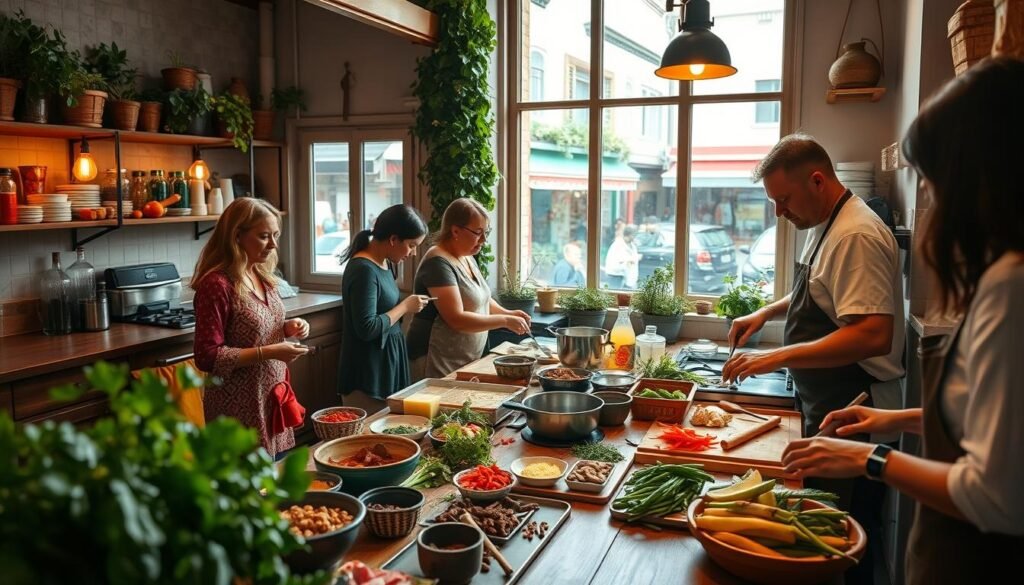
Assessing Your Skill Level
First, figure out your cooking level. Are you new to cooking or do you already know a lot? Picking a class that fits your skill level is important.
Beginners need classes that teach the basics and kitchen safety. More experienced cooks might prefer classes on advanced techniques or specific cuisines.
Considering Class Size
The class size affects your learning. Smaller classes offer more personal attention. Larger classes provide a diverse and lively atmosphere.
- Smaller classes (fewer than 6 students) give you more hands-on time and feedback.
- Larger classes are great for meeting people and trying different cooking styles.
Researching Instructors and Cuisines
The instructors’ skills and the cuisine are key. Look into the instructors’ backgrounds to trust the teaching quality.
Also, think about what cuisine you want to learn. Whether it’s Italian, Thai, or Mexican, make sure the class covers it.
By thinking about these points, you can find a cooking class that boosts your skills and travel joy.
The Role of Local Ingredients in Cooking Classes
Local ingredients are key in cooking classes. They give you a real taste of the area’s food culture. When you join gourmet cooking vacations, you learn more than just recipes. You dive into the local traditions and culture through their food.
Understanding Farm-to-Fork Philosophy
The farm-to-fork philosophy is at the heart of many cooking classes. It’s about using ingredients straight from local farms and producers. This way, you get food that’s fresh, in season, and full of flavor.
Farm-to-fork is more than a trend. It’s a cooking style that links you to the land, farmers, and community. It supports local economies and makes your cooking class more meaningful.
Sourcing Ingredients from Local Markets
Getting ingredients from local markets is a big part of cooking classes. These markets have fresh produce, meats, and special items you can’t find in supermarkets. You get to see the variety and learn how to pick the best.
Going to local markets with your instructor is a highlight of gourmet cooking vacations. You learn about different ingredients and how they’re used in local dishes. This hands-on learning makes your experience more fun and effective.
Blending Travel and Culinary Arts
Traveling and exploring culinary arts opens a world of flavors and cultural insights. As you go on foodie travel adventures, you get to dive into local cuisines and cooking methods.
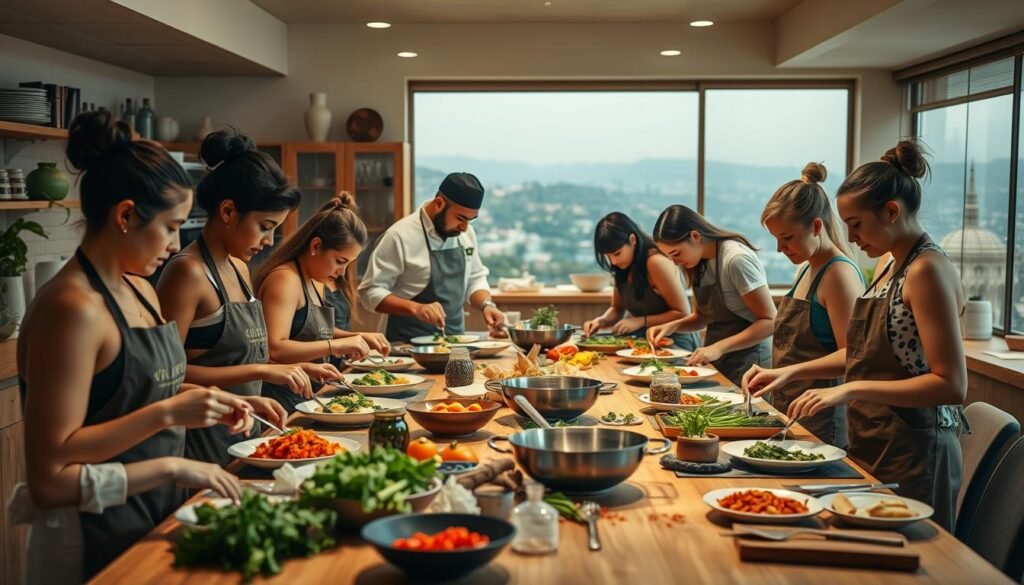
When planning your culinary tour, look for places famous for their food. You can join international culinary workshops for hands-on learning. This lets you master local dishes and understand their cultural background.
Planning Culinary Tours
To plan a great culinary tour, start by researching top culinary destinations. Look for places with cooking classes, market visits, and farm-to-table experiences. Guided culinary tours with expert insights are also a good choice.
When planning, think about the trip’s length, the cuisine you want to explore, and how much cooking you want to do. With careful planning, your culinary tour will be rich and rewarding.
Exploring Regional Dishes and Techniques
Exploring regional dishes and cooking techniques is a highlight of culinary travel. You’ll learn about traditional cooking methods, ingredient sourcing, and the cultural importance of dishes. This knowledge improves your cooking and deepens your cultural appreciation.
Make sure to talk to local chefs and food experts during your tour. They offer valuable insights into the local cuisine and share tips for making authentic dishes at home. Traveling and exploring culinary arts creates lasting memories and a new appreciation for culinary traditions.
Tips for Maximizing Your Cooking Class Experience
To make the most of your cooking class, follow these tips. Whether you’re on hands-on cooking tours or culinary tourism classes, being ready and involved can really boost your learning.
Interactive Participation
One big plus of cooking classes is getting to participate. Don’t hold back; ask questions, try new tastes, and dive into the cooking. Being active helps you understand the recipes better and makes the class more fun.
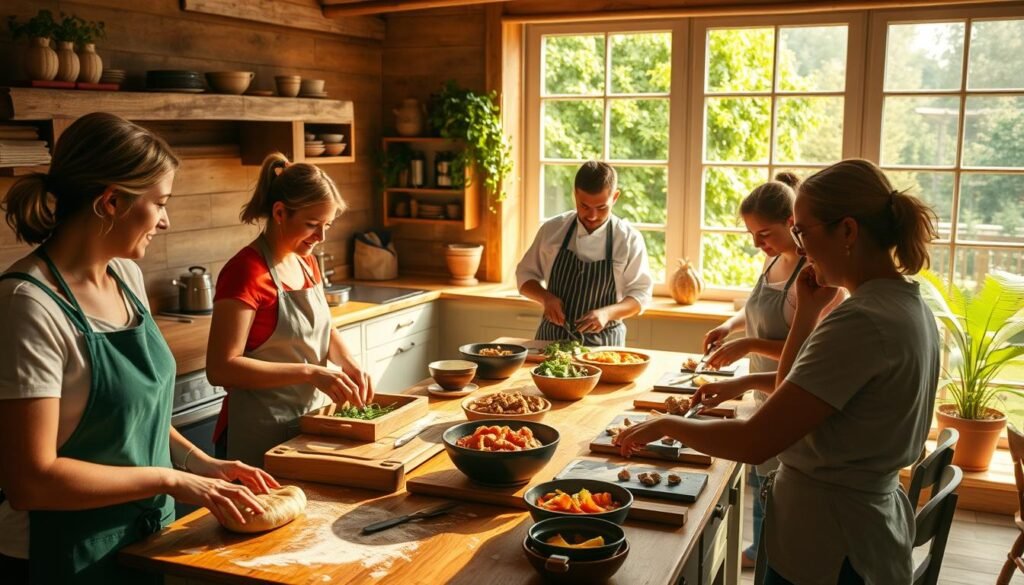
Taking Notes and Recipes Home
It’s important to take detailed notes during the class. This helps you remember the recipes and techniques. Many classes give out handouts, but taking your own notes is a good idea. This way, you can make the dishes again at home easily.
Engaging with Classmates and Instructors
Talking with your classmates and teachers can really add to your experience. You get to learn from others, share your cooking stories, and make new friends. Feel free to chat and ask for cooking tips.
| Tips | Benefits |
|---|---|
| Interactive Participation | Enhanced learning, improved retention |
| Taking Notes and Recipes Home | Ability to recreate dishes, reference materials |
| Engaging with Classmates and Instructors | Networking opportunities, shared knowledge |
Culinary Certifications: Do They Matter?
When you look into immersive cooking retreats, you might ask if getting a culinary certification is worth it. These certifications show off your cooking skills and show you’re serious about cooking. They’re good for both professional chefs and home cooks who love to cook.
Understanding Certification Options
Culinary certifications vary a lot. They cover everything from basic cooking to special cuisines. Some focus on skills like pastry-making or sous vide cooking. Others give a full culinary education. Think about what you want to learn and pick a program that fits your goals.
Types of Culinary Certifications:
- Basic Culinary Arts Certification
- Specialized Cuisine Certifications (e.g., Italian, Thai, Mexican)
- Advanced Techniques Certifications (e.g., pastry arts, molecular gastronomy)
Benefits of Being Certified
Getting a culinary certification can really help you out. For chefs, it can mean better jobs and more money. For cooking fans, it boosts your skills and confidence. Plus, it can lead to new chances, like cooking contests or teaching classes.
The real value of culinary certifications is the knowledge and the chance to meet others who love cooking. They’re great for learning about different foods or just for the joy of cooking. Getting certified can be a fulfilling experience.
Sustainable Practices in Culinary Tourism
Sustainable culinary tourism is more than a trend; it’s essential for the future. As people become more aware of their environmental impact, they seek eco-friendly vacation packages. This includes cooking classes that focus on sustainability.
By picking cooking classes that highlight sustainable practices, you help make a difference. Look for eco-friendly cooking classes that use local ingredients and reduce waste.
Eco-Friendly Cooking Classes
Eco-friendly cooking classes teach you new skills and promote sustainability. They use local, organic ingredients to cut down on food transport’s carbon footprint.
« The way we eat is changing, and cooking classes are at the forefront of this movement, teaching us how to cook sustainably and reduce food waste. »
When choosing a cooking class, seek out those that focus on sustainable cooking. This not only improves your cooking skills but also supports green practices.
Supporting Local Farming Communities
Another key part of sustainable culinary tourism is supporting local farming communities. Cooking classes that use local ingredients help local economies and reduce industrial agriculture’s impact.
| Benefits | Eco-Friendly Cooking Classes | Traditional Cooking Classes |
|---|---|---|
| Environmental Impact | Low carbon footprint | Higher carbon footprint |
| Ingredient Sourcing | Locally sourced, organic | Varied, often non-local |
| Community Support | Strong support for local farmers | Limited support for local farmers |
As you explore cooking classes, think about the impact of your choices. Opting for eco-friendly classes and supporting local farmers makes your culinary journey more sustainable and rewarding.
Future Trends in Cooking Classes Tourism
The culinary tourism industry is changing fast. Cooking classes are getting more popular. You’ll see a move towards more hands-on and interactive gourmet cooking vacations.
Culinary Travel on the Rise
Culinary travel is becoming more popular. People want real cooking experiences that let them connect with local cultures. This is because they’re looking for unique, hands-on experiences that are more than just sightseeing.
Innovative Cooking Class Formats
Cooking class formats are getting a makeover. They’re using new techniques and technologies to make learning more fun. From online courses to farm-to-table workshops, there’s something for everyone.
When planning your next culinary trip, keep an eye on these trends. Whether you’re a pro chef or just love food, now is the perfect time to dive into gourmet cooking vacations and culinary travel.
FAQ
What is cooking classes tourism?
Cooking classes tourism is about traveling to new places to learn how to cook. You get to try out local dishes and cooking methods.
What are the benefits of participating in cooking classes abroad?
Cooking classes abroad boost your cooking skills and let you dive into local cultures. You also meet people who share your interests, making your trip unforgettable.
What types of cooking classes are available for culinary travel experiences?
There are many cooking classes to pick from. You can do hands-on workshops, online courses, farm-to-table experiences, or gourmet vacations. Each one fits different learning styles and preferences.
How do I choose the right cooking class for my needs?
First, think about your cooking level and class size. Look into the instructors and what you’ll learn. Make sure it matches what you want to get out of it.
What is the significance of local ingredients in cooking classes?
Local ingredients are key in cooking classes. They show the farm-to-fork way of cooking. You learn how to use fresh, seasonal ingredients from local markets.
Can I get certified through cooking classes, and is it beneficial?
Yes, some cooking classes offer certifications. Getting certified can boost your cooking skills or help you start a culinary career. It’s a recognized achievement in the field.
How can I make the most of my cooking class experience?
To get the most out of your class, be active and take notes. Bring home recipes and talk with your classmates and teachers. This makes the experience more fun and valuable.
What are some popular destinations for cooking classes tourism?
Italy, Mexico, and Thailand are top spots for cooking classes. Italy is famous for its food, Mexico for its spices, and Thailand for its mix of old and new flavors.
How is culinary tourism promoting sustainable practices?
Culinary tourism supports green cooking classes and local farms. It shows the importance of traveling in a way that’s good for the planet.
What future trends can we expect in cooking classes tourism?
Expect more culinary travel and new cooking class formats. This includes immersive retreats and vacation packages that meet changing traveler needs.

